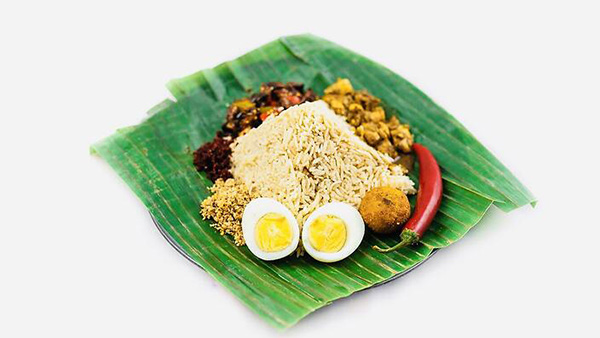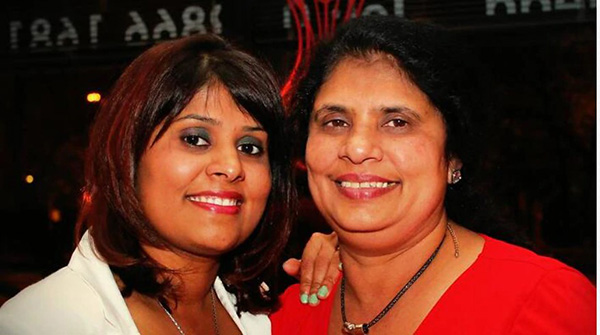This Dutch Burgher lamprais will make you forget curry even exists-By Rushani Epa

Source:SBS
Growing up, Anoma Dassanayake would mirror her mother’s actions – especially in the kitchen. She started by grinding the toasted coriander, cumin and fennel seeds that her mother had given her in a mortar and pestle, and graduated to cooking for her family on timetabled days at the age of 15.
Everything was supremely organised, owing to her mother’s role as a teacher – and that’s how Dassanayake continues to do things at her Scoresby café, Café Dinicious.

Anoma Dassanayake (right) with her daughter Dinithi Dassanayake.
But it’s not just a methodical routine that makes things work, it’s Dassanayake’s commitment to serving traditional Sri Lankan dishes because of her love and respect for her culture.
This might be why she serves the best lamprais in Melbourne. “I’ve tried lamprais everywhere and not many do it properly. It’s a Dutch Burgher tradition which deserves respect. Some people make curry with yellow rice and wrap it up in a banana leaf then call it lamprais, which it’s not,” she says.
Lamprais is a parcel of food hidden inside a banana leaf. Unwrap it to find a mix of tender, bite-sized pieces of meat (either pork, beef, chicken and/or mutton), rice cooked in the meat’s stock, eggplant pickle (Dassanayake’s mother’s specialty), coconut belacan, chilli paste and frikkadel. She adds a fish cutlet in place of frikkadel due to some of her Buddhist clientele not eating beef, and includes a fried boiled egg, too.
“It gives your tummy the balance it needs.”
Because it’s a rich dish filled with ghee, stock and an army of spices, it can make you feel pretty full, but the coconut belacan stores plenty of lemon and crushed prawns in there to help. “It gives your tummy the balance it needs,” she says.
Dassanayake comes from humble beginnings, and she exudes charm and grace. Her mother grew up in a village in Sri Lanka where she didn’t have much access to Western foods. As a result, she was taught to cook using raw spices and exerted a lot of manual labour.
“With the modernisation of dishes, there’s a real lack of traditional cooking. I always prefer genuine Sri Lankan dishes, which I’m used to eating and what I learnt from my mother,” she says. She migrated to Ballarat from Kandy in 2001 with her daughter Dinithi and a copy of the Ceylon Daily News Cookery Book, which she swears by. A year before that, her partner had made the move to study at the University of Ballarat.
“It was really hard for us to find a job and food at the start. Nowadays we can go to the supermarket and get basmati rice but in those days there was nothing,” she says. The family would eventually drive for 1.5 hours each week to visit a Sri Lankan grocer in St Albans.
Her dream to one day own her own venue became true after years of hard work. She moved to Carnegie in late 2001 for Dinithi’s studies and began working at Coles and a friend’s café every day to supplement her daughter’s tuition fees. In 2016, she began Café Dinicious with Dini, who has a knack for cooking, and now the duo cook everything from cakes to hot butter prawns. They offer catering too.
“Making lamprais from scratch at home would take us four hours from start to finish, but takes us 2.5 in the shop,” she says. The team work smart to make things fresh each day, with the only jarred item being the chilli paste they make fresh on site. Like mother, like daughter: each generation vows to keep Sri Lankan culinary traditions alive and fresh.
Stay up-to-date with Café Dinicious via Facebook @diniciousscoresby.
Love the story? Follow the author here: Twitter @theoriginalepa, Instagram @epa___. Photographs by Café Dinicious.
Eggplant pickle (lamprais)
Serves 4-6
Ingredients
● 2 large eggplants, cut into 1cm thick slices
● 2 tsp salt
● 2 tsp turmeric powder
● Oil, for frying
● ½ cup tamarind pulp
● ½ cup white vinegar
● 1 tbsp black mustard seeds
● 1 red onion, finely chopped
● 4 garlic cloves, sliced
● ½ lemongrass stem, chopped
● 1 tbsp ginger, finely chopped
● 1 tbsp ground coriander
● 2 tsp ground cumin
● 1 tsp ground fennel
● 3 large green chillies, de-seeded and sliced
● 8 cm stick cinnamon
● Small spring of curry leaves
● 1 tsp chilli powder (optional)
● 2 tsp sugar
● Salt to taste
1. Rub salt and turmeric all over the eggplant slices and leave for one hour in a colander to drain. Dry with paper towel.
2. Fill a large, heavy-based frying pan with 2.5cm oil. Add eggplant and fry until browned on both sides. Remove to a plate and leave ½ cup of oil in the pan.
3. Toast the ground coriander, cumin and fennel in a small fry pan over low heat until aromas come out and make sure not to burn.
3. Soak the tamarind pulp in 3/4 cup of hot water for 10 minutes. Squeeze to dissolve the tamarind pulp in the water, then strain and discard the seeds and fibre.
4. Blitz mustard seeds and vinegar in a food processor and process to a pulp. Then add onion, garlic, lemongrass and ginger and blitz again until a smooth paste forms. Keep aside.
5. Reheat the remaining oil and fry the mustard seed paste for five minutes. Add toasted spices, fresh chilli, cinnamon, curry leaves, tamarind liquid and chilli powder (if using).
6. Add the fried eggplant, cover and simmer for 15 minutes.
7. Remove from heat then stir in the sugar and add salt to taste.
8. Cool and store the pickle in sterilised jars. It will keep for months but ensure no cross-contamination by only using clean spoons to get it out each time.
9. Serve with rice and curry, or lamprais.







